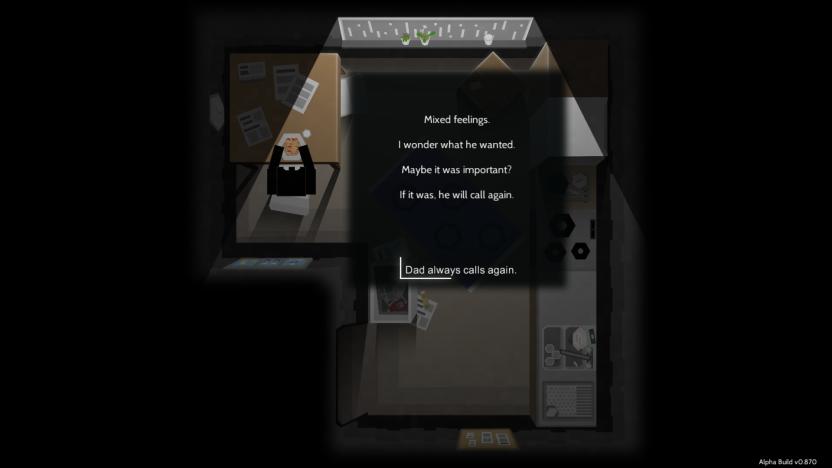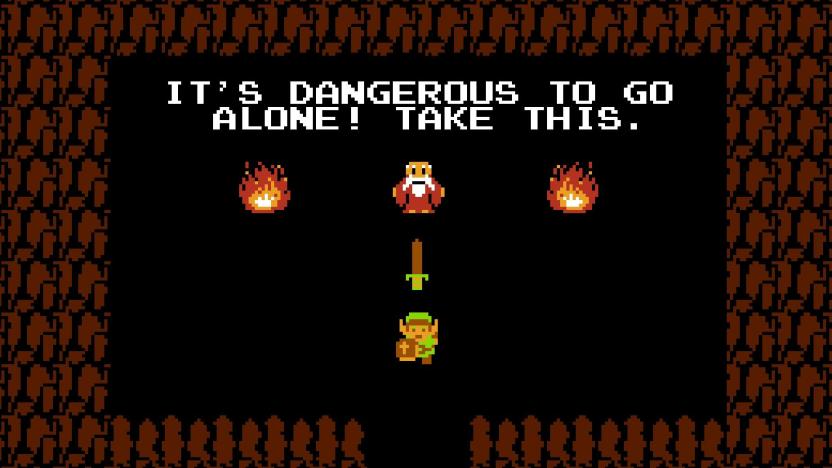MentalHealth
Latest

Cyberbullying nets '13 Reasons Why' mature rating in New Zealand
New Zealand has come out hard in its opposition to Netflix's series 13 Reasons Why. The high-school-focused show centering on a girl's suicide and its aftermath already has content warnings ahead of certain episodes, but a recent edict by New Zealand's Office of Film & Literature Classification rules that Netflix "will now be required to display a clear warning in respect to the series, as well as in respect to each episode." This comes after the country's 2015 ruling that makes cyberbullying a punishable offense. Furthermore, the series has received the region's first-ever RP18 rating, which means unless viewers are 18 or older, they should watch the show with an adult.

'Please Knock on My Door' is a digital life of depression
At first, depression doesn't sound like the most thrilling topic to explore in a video game. It's antithetical to the boisterous, action-packed, neon-tinted tone that generally dominates the industry -- but that doesn't mean depression doesn't make for a compelling game. After all, video games are immersive experiences that can open up new worlds to people across the globe, inviting players to feel what life is like in another body, on another planet, in another universe. In another mind.

Blood test results could help predict bipolar symptoms
Researchers have discovered a possible link between bipolar disorder and certain blood markers. The UK-based longitudinal study (PDF) started when kids were nine years old, examining if the presence of the infection-fighting interleukin-6 (IL-6), C-reactive protein and asthma or eczema had a link to hypomania when the participants were 22 years old. Turns out that higher levels of IL-6 at childhood are indicative of hypomanic symptoms later in life -- depression and psychosis -- which can lead to bipolar disorder.

Pokemon Go's mental health benefits are real
Dr. John Grohol is an expert in technology's impact on human behavior and mental health, and for the past 20 years he's studied how people operate online. He's the founder of mental health network Psych Central, and he knows all about the latest tools aimed at helping people deal with anxiety, depression and a host of other issues. And Grohol has never seen anything like Pokemon Go. "In terms of the phenomena of people expressing the benefits of playing the game to their real-world mental health status, I think that's very unique and it's the first time I've ever seen anything like that," he says.

Facebook opens suicide prevention tools to everyone
That emo Facebook update your friend posted may be a passing bout of frustration, or it may be a sign of something deeper. If you suspect your connections of having suicidal thoughts and want to help, but don't feel equipped to reach out, a tool from the social network is now available to everyone, making it easier to show concern.

Brain testing app will help diagnose mental health issues
Savonix is a company that claims to take the "analog processes" of cognitive assessment into the digital age. The firm is launching an iOS and Android app that, for the next six weeks, will let anyone examine their own mental ability. Users will have to undergo a series of tests that test the limits of their ability, from smart thinking through to emotional control. Whereas previously these tests would have been worked out on pen-and-paper under the supervision of a stern looking psychologist, now it's open to anyone. After the open beta closes and all of the kinks have been worked out, the app will become exclusively available to users who license the app through "healthcare organizations."

Walgreens to launch web-based mental health assesments
Walgreens is taking an unprecedented step in combating America's critical shortage of mental health professionals. The company announced on Tuesday that it is partnering with nonprofit Mental Health America will offer screenings through its website. The service will evaluate for depression, bipolar disorder, PTSD and a host of other mental illnesses. If any issues surface as a result of the screening, an MHA representative will be available to help the user find and schedule follow-up treatment nearby. And, if there's no qualified medical practitioner in their area, users will also have the option to discuss the matter with one of 1,000 state-licensed professional therapists or psychiatrists over the phone.

LSD makes you think like a baby
Researchers at Imperial College London believe that they know what effect LSD has on the human brain. After pumping test subjects full of the stuff and shoving them in an MRI, the team learned that the drug makes our brains behave similarly to that of a baby. In order to understand this, imagine that your mind is the single floor of an office, with cubicles running as far as the eye can see. Each cubicle is responsible for different jobs, such as memory, balance and hearing, only talking to each other on the annual company retreat. LSD is like a disgruntled former employee, temporarily smashing down the plyboard dividers and forcing everyone to collaborate.

Scientists identify neurons that help you process emotions
Scientists just got one step closer to understanding the nuts and bolts of how your mind handles emotions. An MIT team has identified two neural connections in the brain's amygdala regions that process positive and negative emotional events. By tagging neuron groups with a light-sensitive protein, they discovered that the neurons form parallel but complex channels that respond differently to given situations. Some neurons within one of those connections will be excited by a feeling, while others will be inhibited -- the combination of those reactions in a given channel may determine the emotion you experience.

Fighting depression in the video game world, one AFK at a time
Matt Hughes took his own life in the fall of 2012. He was a freelance reporter covering the video game industry, and before he committed suicide, he sent emails to some of his editors, noting that he wouldn't be able to turn in more stories for one simple reason: He'd be dead. His suicide surprised nearly everyone who worked with him. Speaking with Kotaku days after Hughes' death, his former editors said things like There weren't any red flags and This was a complete shock. Hughes wasn't the only person in the video game industry to take his own life that year, and as the tragedies piled up, it became impossible to ignore their commonalities. Complete surprise. No one knew. She seemed fine. For Russ Pitts and Susan Arendt, two editors who had worked with Hughes and regularly interacted with dozens of other freelance reporters, these suicides were more than a shock. They were a wakeup call.

'Take This' livestream starts today with video game stars, swag
Take This is a non-profit that educates and supports those with depression, anxiety and other mental health issues, with a focus on the video game community. Starting today at 12PM ET, Take This hits Twitch for a two-day livestream starring BioShock creator Ken Levine, popular gaming critic Jim Sterling, Tom Clancy's son and game developer Thom Clancy, and other famous figures of the industry. Donate during the stream for a chance to win sweet gaming swag, including a signed Octodad poster, an IGN gift pack, a remote-controlled replica of Claptrap from Borderlands or a custom Fallout 4 Xbox One.

Video games are pretty lazy in their portrayal of PTSD
It's reported that one in three troops returning home from war are being diagnosed with post-traumatic stress symptoms. If you look at video games, those numbers are probably exponentially higher considering the events characters endure while saving the (virtual) world. But games aren't exactly known for being particularly subtle, and that's what the latest episode of Low Batteries from Eurogamer is all about. The clip examines Metal Gear Solid V: The Phantom Pain, Spec Ops: The Line, Deus Ex: Human Revolution and a few others. The findings? Sadly, games use PTSD as short-hand to fill in character backstory or motivations and sometimes are pretty lazy about it.

Former 'DmC' devs are risking millions to make a 'AAA' indie
Hellblade, a third-person game seen through the lens of a mentally ill protagonist, is a multimillion-dollar risk for developer Ninja Theory. Its strong focus on building a unique world and narrative represents a huge shift in creative direction from the company's last AAA effort, the melee combat-heavy DmC: Devil May Cry. Rather than working with a big publisher, the Cambridge, England-based studio is self-funding Hellblade as an "independent AAA" title. It's a decision that's freed Ninja Theory from creative constraints, allowing it to tackle difficult topics and simply make the games it wants to make.

Video games are tackling mental health with mixed results
Mental illness occupies a strange place in video games. After centuries of misdiagnosis and misinterpretation, we've begun to comprehend the reasons behind disorders and their prevalence in modern society. Recent research shows that roughly one in five American adults suffers from some form of mental health issue each year. When it comes to the media, though, these conditions are frequently misrepresented and misunderstood, and video games in particular lean on lazy stereotypes and tropes. Mental illness is used as a motivation for villainy, thrown in as an "interesting" game mechanic or mischaracterized as the sum and whole of a character's personality. There's a worryingly pervasive stigma surrounding mental conditions, and as one of our most dominant art forms, video games need to do a better job in portraying them.

Research study tests if smartphones can diagnose depression
Clinical depression is the kind of ailment that can sneak up on you, ruin your attitude, destroy motivation and lead to a multitude of other mental health issues. It can be managed if you're aware of it, but a lot of depression goes undiagnosed. It doesn't have to be that way--researchers think that smartphones could one day serve as an early-warning system by passively monitoring your behavior.

'Hellblade' is a terrifying journey through one person's mental hell
Hellblade has been shrouded in shadows since its announcement at Gamescom last year, but the veil is finally lifting. Developed by Enslaved, Heavenly Sword and DmC: Devil May Cry studio Ninja Theory, Hellblade is a dark, fantastical battle through the mind of the Celtic warrior Senua. Senua suffers from anxiety, depression, hallucinations and delusions, and the game presents some of these intangibles as literal demons for Senua to destroy. The studio wants to treat the subject with respect: The Hellblade team is working with Paul Fletcher, a professor of Health Neuroscience at the University of Cambridge, and the game is supported by global mental-health foundation Wellcome Trust.

Internet forums are good for you
Internet forums have a positive impact on life satisfaction and lead to increased involvement in communities outside the confines of the online world, according to a study published in Computers In Human Behavior. Redditors might be doing it right. The study approached users on a range of interest, lifestyle and hobby forums. The study split users into two groups: stigmatized subjects (like mental health discussion), and non-stigma related forums (sports, cooking and the rest). They were then polled about their reasons for joining the forum, how they felt about it, their life satisfaction and offline engagement with "issues raised in the forum". Author lead Dr. Louise Pendry of the University of Exeter said that: "As well as finding answers, our study showed users often discover that forums are a source of great support, especially those seeking information about more stigmatizing conditions."

Axio's EEG headband helps you teach your brain to focus (hands-on)
Usually when an EEG sensor headset graces these pages, it's used to peer into your thoughts or grant the wearer the power to control other gadgets with his or her mind. While such uses have appeal, start-up company Axio has a new EEG headband that aims to help you learn to better control your own brain. It tracks your level of mental focus in real-time and provides positive reinforcement audio feedback when you're mentally locked in. The neoprene band packs a trio of electrodes, a PCB with a Bluetooth radio and audio out, and a battery pack to power everything. It works by identifying the brainwave readings that correlate to ideal executive function in your pre-frontal cortex and shooting that data to your computer or phone via Bluetooth. Axio's software then shows an onscreen graph that charts your focus level in real-time, and for folks who prefer a more literal tracking method, there's a photo above the chart that moves in and out of focus along with your mind. Additionally, the headband provides pleasing audio neurofeedback when you're focused in order to train you to stay mentally engaged.%Gallery-158654% Unfortunately, we couldn't get much more information about the neurofeedback functionality, as the technology behind it is the company's secret sauce, and it won't divulge more until it's got the cash to bring the band to market. We also weren't able to actually test the band to see how it works, as it's still in the prototype phase and there's still a kink or two left to work out. Axio did tell us that the prototype we got our mitts on was the result of just six short months of work, and that after hacking together the original design using Arduino, the current iteration has a custom PCB better suited to Axio's needs. Co-founder Arye Barnehama also informed us that the band should be on sale by the end of summer, though he wouldn't say for how much or where we'll be able to pick one up. Sometime after it hits store shelves, Axio plans to release an SDK so that enterprising devs can make their own focus-aiding software and implement whatever audio feedback they prefer to help them take care of business -- a dose of Bachman-Turner Overdrive ought to do the trick.

Schizophrenic computer may help us understand similarly afflicted humans
Although we usually prefer our computers to be perfect, logical, and psychologically fit, sometimes there's more to be learned from a schizophrenic one. A University of Texas experiment has doomed a computer with dementia praecox, saddling the silicon soul with symptoms that normally only afflict humans. By telling the machine's neural network to treat everything it learned as extremely important, the team hopes to aid clinical research in understanding the schizophrenic brain -- following a popular theory that suggests afflicted patients lose the ability to forget or ignore frivolous information, causing them to make illogical connections and paranoid jumps in reason. Sure enough, the machine lost it, and started spinning wild, delusional stories, eventually claiming responsibility for a terrorist attack. Yikes. We aren't hastening the robot apocalypse if we're programming machines to go mad intentionally, right?

New UK Internet Addiction clinic offers in-patient therapy to 'screenagers'
Internet addiction, as you know, is a growing worldwide concern. Recently, the UK opened its first rehab clinic for Internet Addiction (the provocatively named Broadway Lounge), but that was only the beginning. Capio Nightingale Hospital in London has announced its own plan to get gets out of the World of Warcraft and into the real world through an intensive in-patient, day care, or group therapy environment. The program is aimed at 15 to 17-year-olds, although kids as young as 12 could participate. A hospital spokesman said that the service hopes to "address the underlying causes of this addiction to transform screenagers back into teenagers." And if you thought we were running this because we wanted to use the word "screenagers," you might be on to something.









